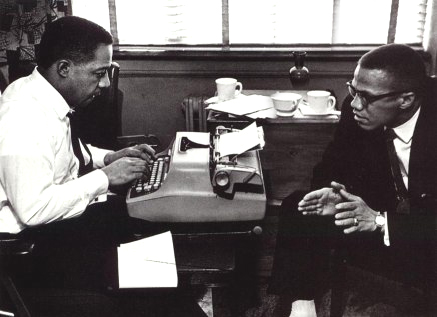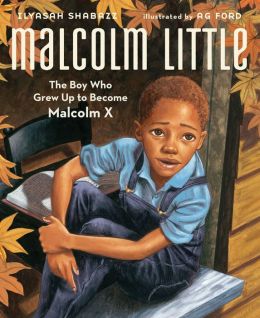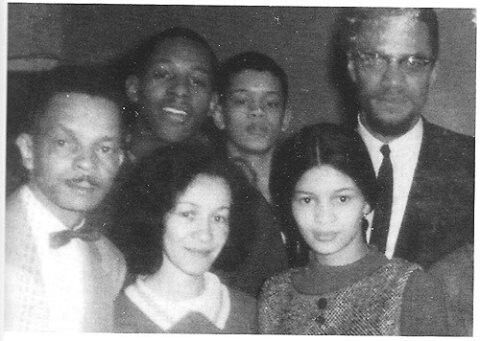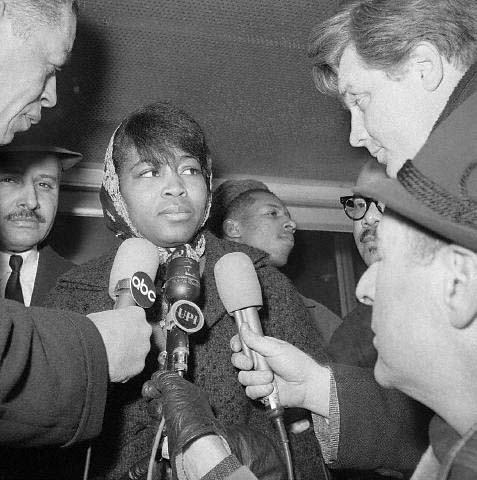Malcolm X was born Malcolm Little on May 19, 1925 in Omaha, Nebraska. His mother, Louise Norton Little, was a homemaker occupied with the family’s eight children. His father, Earl Little, was an outspoken Baptist minister and avid supporter of black nationalist leader Marcus Garvey. Earl’s civil rights activism prompted death threats from the white supremacist organization Black Legion, forcing the family to relocate twice before Malcolm’s fourth birthday.
Malcolm’s siblings: (in order of birth) Ella, Earl and Mary (half-siblings from Earl’s previous marriage); Wilfred, Hilda, Philbert, Reginald and Yvonne.
Rev. Little was found dead in 1931 after being beaten and left on the train tracks, where he was run over by a streetcar. Malcolm was 6 at the time. No one was ever convicted of the crime but his death is widely attributed to the Black Legion. Malcolm’s mother spent the next 26 years in a Kalamazoo mental institution because of the uncertainty and paranoia around her husband’s murder, as well as the stress from her failure to provide for her 6 children at the height of the Great Depression.
Malcolm X was with the Nation of Islam during the 1950s and ’60s, where he worked under NOI leader, Elijah Muhammad expanding the group’s membership among black Americans nationwide. Due largely to his efforts, the NOI grew from 400 members at the time he was released from prison in 1952 to 40,000 members by 1960.
Malcolm X became the minister of Temple No. 7 in Harlem and Temple No. 11 in Boston, while also founding temples in Hartford and Philadelphia. In 1960, he established the national newspaper, Muhammad Speaks, in order to further promote the message of the NOI.
In 1963, Malcolm X became disillusioned when he learned that Muhammad had violated his own teachings by carrying on many extramarital affairs. Malcolm’s feelings of betrayal, combined with Muhammad’s anger over Malcolm’s comments regarding the assassination of President John F. Kennedy, led Malcolm leaving the NOI in 1964.
That same year, Malcolm X went on a trip through North Africa and the Middle East. The trip was a turning point in his life. He learned to place the American Civil Rights Movement within the context of a global anti-colonial struggle, embracing socialism and Pan-Africanism. Malcolm X also made the Hajj, the traditional Muslim pilgrimage to Mecca, Saudi Arabia, during which he converted to traditional Islam and changed his name to El-Hajj Malik El-Shabazz.
Malcolm X announced the establishment of the Organization of Afro-American Unity (OAAU) at a the Audubon Ballroom on June 28, 1964. He had written the group’s charter with John Henrik Clarke, Albert Cleage, Jesse Gray, and Gloria Richardson, among others.
Malcolm X, along with Clarke, wrote the Organization of Afro-American Unity (OAAU) Basic Unity Program:
- Restoration: “In order to release ourselves from the oppression of our enslavers then, it is absolutely necessary for the Afro-American to restore communication with Africa.”
- Reorientation: “We can learn much about Africa by reading informative books.”
- Education: “The Organization of Afro-American Unity will devise original educational methods and procedures which will liberate the minds of our children. We will … encourage qualified Afro-Americans to write and publish the textbooks needed to liberate our minds … educating them [our children] at home.”
- Economic Security: “After the Emancipation Proclamation … it was realized that the Afro-American constituted the largest homogeneous ethnic group with a common origin and common group experience in the United States and, if allowed to exercise economic or political freedom, would in a short period of time own this country. We must establish a technician bank. We must do this so that the newly independent nations of Africa can turn to us who are their brothers for the technicians they will need now and in the future.”
At a speaking engagement in the Manhattan’s Audubon Ballroom on February 21, 1965 three gunmen rushed Malcolm onstage. They shot him 15 times at close range. The 39-year-old was pronounced dead on arrival at New York’s Columbia Presbyterian Hospital.
Fifteen hundred people attended Malcolm’s funeral in Harlem on February 27, 1965 at the Faith Temple Church of God in Christ (now Child’s Memorial Temple Church of God in Christ). After the ceremony, friends took the shovels away from the waiting gravediggers and buried Malcolm themselves.
Later that year, Betty gave birth to their twin daughters Malikah & Malaak.
Malcolm’s murderers, Talmadge Hayer, Norman 3X Butler (Muhammad Abdul Aziz) and Thomas 15X Johnson (Khalil Islam) were convicted of first-degree murder in March 1966. The three men were all members of the Nation of Islam. Aziz was paroled in 1985; Islam was freed in 1987. Hayer (the only murderer that confessed), now known as Thomas Hagan, was freed in 2010.

The Autobiography of Malcolm X
“The Autobiography of Malcolm X was published in 1965, the result of a collaboration between human rights activist Malcolm X and journalist Alex Haley. Haley coauthored the autobiography based on a series of in-depth interviews he conducted between 1963 and Malcolm X’s 1965 assassination. The Autobiography is a spiritual conversion narrative that outlines Malcolm X’s philosophy of black pride, black nationalism and Pan-Africanism. After the death of his subject Haley authored the book’s epilogue, which describes their collaboration and summarizes the end of Malcolm X’s life.
While Malcolm X and scholars contemporary to the book’s publication regarded Haley as the book’s ghostwriter, modern scholars tend to regard him as an essential collaborator who intentionally muted his authorial voice to allow readers to feel as though Malcolm X were speaking directly to them. Haley also influenced some of Malcolm X’s literary choices; for example, when Malcolm X left the Nation Of Islam during the composition of the book, Haley persuaded him to favor a style of “suspense and drama” rather than rewriting earlier chapters into a polemic against the Nation. Furthermore, Haley’s proactive censorship of the manuscript’s antisemitic material significantly influenced the ideological tone of the Autobiography, increasing its commercial success and popularity although distorting Malcolm X’s public persona.”
“An established classic of modern America, “The Autobiography of Malcolm X” was hailed by the New York Times as “Extraordinary. A brilliant, painful, important book.” Still extraordinary, still important, this electrifying story has transformed Malcolm X’s life into his legacy. The strength of his words, the power of his ideas continue to resonate more than a generation after they first appeared.”
Born on August 11, 1921, in Ithaca, New York, Alex Haley was an American writer whose works, including Roots and The Autobiography of Malcolm X, centered on the struggles of African Americans. He died in Seattle, Washington, on February 10, 1992.

Alex Haley and Malcolm X
“Haley got his big break in 1962 when Playboy magazine assigned him to conduct an interview with the famous trumpeter Miles Davis. The interview was such a success that the magazine contracted Haley to do a series of interviews with prominent African-Americans. Known as “The Playboy Interviews,” Haley interviewed such prominent figures as Martin Luther King Jr., Sammy Davis Jr., Quincy Jones and Malcolm X. After concluding his 1963 interview with Malcolm X, Haley asked the civil rights leader if he could write a book on his life. The result, two years later, was The Autobiography of Malcolm X: As Told to Alex Haley. A seminal book of the civil rights movement as well as an international bestseller, the book memorialized for eternity the life of Malcolm X while transforming Haley, his collaborator, into a celebrated writer.
In the aftermath of The Autobiography of Malcolm X, Haley embarked on a hugely ambitious new project to trace and retell the story of his ancestors’ journey from Africa to America as slaves, and then their rise from slavery to freedom. During a decade of research on three continents, Haley examined slave ship records at archives in the United States and England and traveled to Gambia, the home of his ancestors in West Africa.
In his ancestral village of Juffure, Haley listened to a tribal historian recount how Kunta Kinte, Haley’s ancestor and the protagonist of his book, was captured and sold into slavery. Still, despite his meticulous research, Haley often despaired that he could never recapture the true spirit of his ancestors. He once recalled, “I asked myself, what right had I to be sitting in a carpeted high-rise apartment writing about what it was like in the hold of a slave ship?” In an attempt to answer this question, he booked passage on a ship from Liberia to America and spent his nights lying on a board in the hold of the ship in nothing but his underwear. When Haley finally published Roots in 1976—part fictionalized novel, part richly detailed historical account—the book caused a national sensation.
A review in The New York Times stated, “No other novelist or historian has provided such a shattering, human view of slavery,” and the book went on to win the Pulitzer Prize. In 1977, ABC adapted Roots into a television miniseries that attracted a record-shattering 130 million viewers. Thirty-seven American cities declared January 23-30, the week the program aired, “Roots Week.””
The Last Speech ~ February 14, 1965, Ford Auditorium, Detroit, Michigan
Quotes – “..since the white man, your friend, took your language away from you during slavery, the only language you know is his language. Your friend’s language. So you call for the same god he calls for. And when he’s putting a rope around your neck, you call for god and he calls for god. And you wonder why the one you call on never answers you…”
” … when they’re putting the rope around your neck you say ‘forgive them Lord for they know not what they do.’ As long as they’ve been doing it they’re experts at it. They know what they’ve been doing …”
On Sunday afternoon, February 21, 1965, just before delivering an address at the Audubon Ballroom, Malcolm X was assassinated before a crowd of hundreds of people, including his pregnant wife Betty Shabazz and three of their four children.
President Kwame Nkrumah of Ghana sent a telegram of condolence to Malcolm’s widow, saying that “your husband lived a life of dedication for human equality and dignity so that the Afro-American and people of color everywhere may live as man. His work in the cause of freedom will not be in vain …”
” … Malcolm’s assassination was a profoundly political event. It was because of his ideas and his politics that he represented a threat to the privileges and vested interests of powerful groups, both white and black. Whatever the immediate pretext, it was certainly this threat in the background which caused his enemies to wish to be rid of him. [written by Monthly Review’s editors in 1965.]

Malcolm Little: The Boy Who Grew Up to Become Malcolm X
by Ilyasah Shabazz
Here is a man who was killed for his ideas. Think of it! In 1965, when we have become inured to the hypocrisy, venality, stupidity, and brutality of public figures in this blighted land, he was a hero, a martyr.”
After her husband’s death, Betty Shabazz dedicated herself to raising her children and continuing her education, eventually receiving a Ph.D. (1975) in education administration from the University of Massachusetts. In 1976 Shabazz began working at Medgar Evers College, first as a professor, then as the director of its department of communications and public relations.
On the night on June 1, 1997, authorities responded to a fire at Shabazz’s residence in Yonkers, New York. According to reports, she sustained burns over 80% of her body. Her grandson Malcolm was held under suspicion of starting the blaze. On June 23, after several operations in the hospital, Betty Shabazz died. She was 63 years old. On July 10, Malcolm, then 12, pleaded guilty to the juvenile equivalent of manslaughter and arson. He was sentenced to 18 months in a juvenile facility for troubled adolescents. He remained in state custody for almost four years. In April 2001, he was sent home with an electronic monitoring device, but soon ended up back in detention due to curfew violations. In January 2002, he was arrested in Middletown, New York on robbery and burglary charges. That September, he was sentenced to 3½ years in prison. He received parole in May 2006.
Her grandson Malcolm Shabazz (the son of Qubilah) said in 2012: “I didn’t mean for my grandmother to get hurt. I wasn’t thinking anything like that would happen. [I thought] she would go to the fire escape [but] she walked through the fire to get to me. I didn’t think she would walk through a fire for me. People say [to me] “Oh you are the one who burned down your grandmother’s house?” [But]…it didn’t really happen like that. I’ve always told the same story. [I was] coerced to say something else, because [I was told] it would be better for me. [I was told] I would go to jail forever… “
Shabazz died in Mexico City on May 9, 2013 at the age of 28.
Malcolm and Betty Shabazz are survived by their daughters Attallah, Qubilah, llyasah, Gamilah, Malikah & Malaak Shabazz.















Reblogged this on The New Liberator.